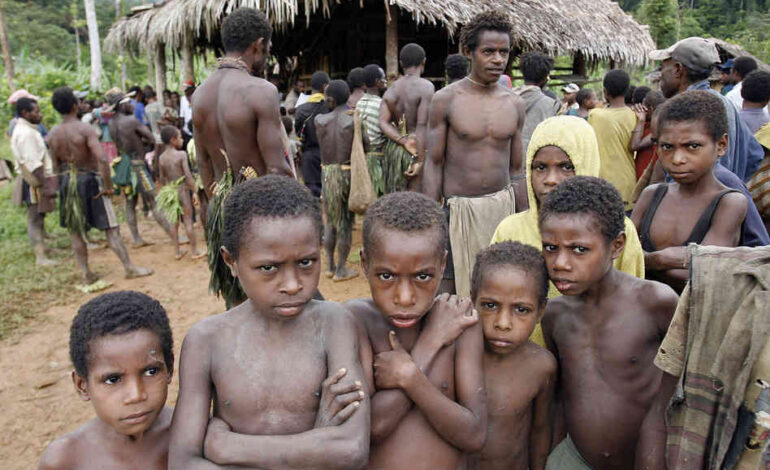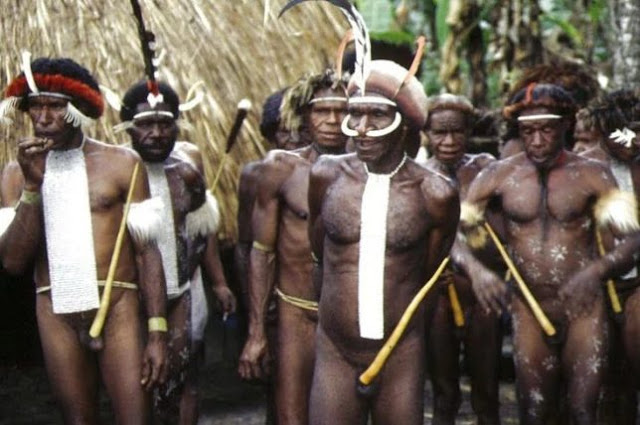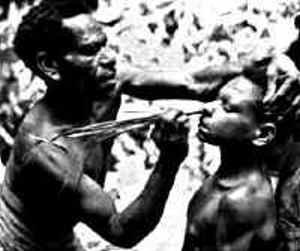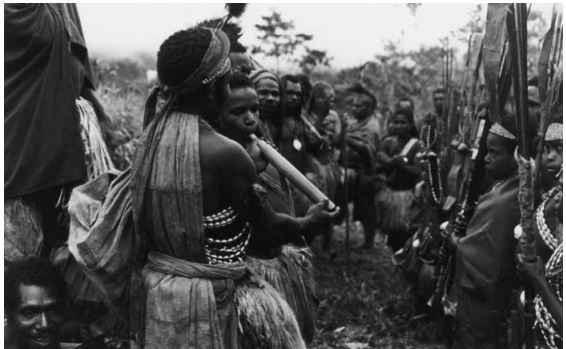
Ekeomah Atuonwu
One of the strangest cultures known to westernization is that of the Sambian people of Papua New Guinea. Their ceremonial act of initiation has been referred to as “ritualized homosexuality” by cultural researcher Gilbert Herdt.
Young boys are taken away from their mothers once they become seven or nine. This procedure enables the separation of the boys from their mothers, whose blood is thought to have been tainted. Women are thought to have special abilities (tingu) that enable them to control males with ease. Each time a woman goes through her menstrual cycle, her tingu is reinforced. The lads must therefore be delivered by a ritualistic bloodletting.
The blood-letting ceremony involves beating the boys with long sticks on their nostrils until they bleed. That way, the woman’s tingu is completely got rid of.
Once this is done, he is made to perform oral sex on the older ones which they do not stop until they take in the semen. Ingesting the semen will make them stronger as is their belief. More so, they are kept aside for three years and maintain a strict diet to make them stronger. Defiance against this from the boys usually involves death.

His father and kinsmen start looking for a wife for him after they get over this stage. He must wait till she experiences her first period. He is trained to stay away from totally gratifying the woman while he waits for this since she could cause him to become ill and pass away.
He gets another nosebleed to rid himself of her diseases after having relations with her.
They only cease this procedure and earn recognition as warriors and mature men after giving birth.
The male cult hides this custom from the public. Castration and death are the results of telling his wife.
The Six Stages of the Initiation Into Manhood
The Maku Stage: After the little boys have been separated from their mothers, they are taken to a place where they get beaten and are made to suck on a flute. Then they get stabbed in their nostrils with sticks. The nose bleed is believed to rid them of their mother’s blood, in other words, the boys cease to be “mama’ s boys”.

To conclude this stage, the little boys get dressed in ritual attire and are taken to a cult house. There, they meet with other older boys who perform a sexual dance. Then as the day gets darker, the little boys are required to join the older boys on the dance ground and start performing oral stimulation on the penis of the older boys.
When the older boys ejaculate, the younger boys are required to drink the semen — which is believed to make the little boys more masculine.

Imbutu Stage: In the Imbutu stage, the boys are commended and rewarded for their performance on the previous stage. There is usually a lot of male bonding between the younger and older boys as a result of the intimacy of the previous stage.
Immangwi Stage: This stage begins the moment the little boys reach puberty (13 to 16 years), they no longer need to participate in fellatio. Rather they are taught gender roles and more on heterosexual intercourse. After this training, they are expected to look for a wife so they can start practicing all they’ve learned.
Nupusha Stage: This is the stage that takes place once the boys turn 16 and are already married. They are to constantly have sexual intercourse with their new wife.
Taiketnyi Stage: At this stage, when the wife has her first menstrual cycle as a new bride, the boy is to endure another round of bloodletting.
Moondung Stage: This is the final stage where the wife gives birth to her first child. It is considered the completion of the Rites of Passage because, at this point, the boy is now considered a full-grown man.
As of 2006, it was noted that there had been a sexual revolution in the Sambia culture as a result of various government interventions and influence from several missionaries as well as modern education.




